- By Dan Veaner
- Around Town
 Print
Print
"I am speaking about the German state sponsored period of the greatest mass murder in the entire human history of totally innocent men, women and children, which happened in my life time, all caused by one ugly four letter word -- hate." So began Holocaust survivor Fred Voss, who miraculously escaped Nazi Germany with his parents and grandmother in four months before the outbreak of World War II in 1939. Voss came to Lansing High School last week on the first International Holocaust Remembrance Day to tell students what it was like to be a Jewish boy close to their own age under the Nazis.
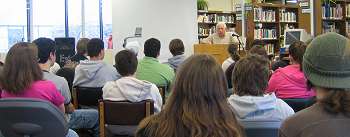
Personable and passionate, Voss made it "up front and personal" for the student who came to hear him speak of the six years he and his family lived under Nazi rule. "Hearing about the Holocaust from someone who actually lived through it makes it much more realistic than reading it in a textbook," says student Travis Miller. He was inclusive of other countries where "ethnic cleansing" and the killing of innocents is taking place today. "Oh, we see them on television, we read about them in the newspapers," he said. "What are we doing about them?" He admonished the students to be tolerant of people who are different from them, and not to hate.
Voss was 12 years old when the Nazis came into power in 1933. On his confirmation day on April 1 he came home to find that the Nazis had begun boycotting Jewish stores, including his family's. They could not have his confirmation party because they couldn't get into the store where they lived upstairs. Two years later he was beaten by fellow classmates in school because he was Jewish. "I remember when one of our teachers, who dressed in a black SS uniform, told me one day that I should stand up in class so that the other students could see what a Jew really looked like," he said.
Another teacher made Jewish children stand at attention while the rest of the class sang "When Jewish blood gushes from our knives." These stories were all the more chilling told in the High School. Before the Nazis ruled German students wouldn't have imagined such atrocities taking place in their school, just as Lansing students do not in our time.
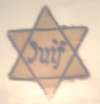 Each story, more outrageous than the last, illustrated how fast Nazi power grew. He showed a picture of a yellow star belonging to his aunt. All Jews were forced to wear such a star when they went out. Failure to do so meant an automatic sentence to a concentration camp. He told of his experience on Kristallnacht, or Kristall Night ("Night of the Broken Glass") when the Nazis trashed and looted 7000 Jewish businesses, burned down 1000 synagogues, killed countless Jews and rounded up more, including Voss's father. He described watching bystanders who had come to see his temple burn.
Each story, more outrageous than the last, illustrated how fast Nazi power grew. He showed a picture of a yellow star belonging to his aunt. All Jews were forced to wear such a star when they went out. Failure to do so meant an automatic sentence to a concentration camp. He told of his experience on Kristallnacht, or Kristall Night ("Night of the Broken Glass") when the Nazis trashed and looted 7000 Jewish businesses, burned down 1000 synagogues, killed countless Jews and rounded up more, including Voss's father. He described watching bystanders who had come to see his temple burn.
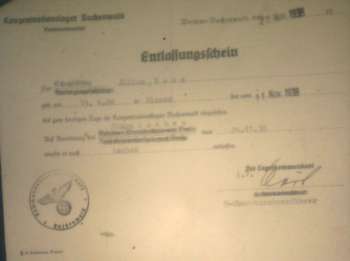
The elder Voss's release paper from Buchenwald
One of the most remarkable incidents Voss related was when the Nazis told his mother that if she signed everything the family owned over to them that they would release his father. What makes the incident remarkable is that they actually did release him from Buchenwald, and Voss showed the students something very rare: a release form from a Nazi death camp. The elder Voss was very lucky. Six million other Jews were killed. A picture of naked bodies in a huge pile illustrated the cruelty and attack on life and dignity.
The Lansing students seemed stunned when Voss asked for questions -- it was a while before they began to ask. One asked how he could keep his faith during such an ordeal. Afterward Will Opperman said, "It was breathtaking to hear firsthand the story of someone who survived such a tragic period." Another student, Michael Kaplan, said, "Mr. Voss' story of his escape from Nazi Germany was both exciting and impressive. It is impossible to leave his presentation without thinking about how much life is taken for granted."
Casey Nassif said, "The presentation breathed realism into the terrible things that I had read about. The Holocaust seemed like history, but now it feels like yesterday." Jennifer Pasto added, "It was amazing how much energy he had and how strong he is as a person. It was very emotional and it was an honor to hear him speak to us."
After the afternoon session Superintendent Mark Lewis said, "As I listened to his words, I felt privileged to be in the presence of someone who not only could speak first hand about one of history's most atrocious acts of inhumanity, I also felt a sense of awe knowing that he could do so in such a straightforward, objective manner. In this way he allowed the facts of the Holocaust to speak for themselves, which added significant power to his message."
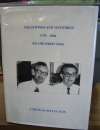 Voss came to the United States in 1940 and volunteered to serve in the US Army. In 1944 he was part of the liberation of Paris, and in 1946 he was assigned to Frankfurt where he helped provide relief for the homeless displaced people returning from concentration camps. Voss recently published a book, "Milestones and memories," that tells about his life before, during and after Hitler. All the proceeds go directly to the US Holocaust Museum in Washington, D.C.. An earlier book was used as a text book to teach German students about Kristalnacht in the late 1960s.
Voss came to the United States in 1940 and volunteered to serve in the US Army. In 1944 he was part of the liberation of Paris, and in 1946 he was assigned to Frankfurt where he helped provide relief for the homeless displaced people returning from concentration camps. Voss recently published a book, "Milestones and memories," that tells about his life before, during and after Hitler. All the proceeds go directly to the US Holocaust Museum in Washington, D.C.. An earlier book was used as a text book to teach German students about Kristalnacht in the late 1960s.
Voss told the Lansing students, "I have never accepted one cent (for speaking engagements or books) because I will never make money on the blood of the victims." He said his mission is to teach people to be tolerant of each other, saying, "Please do me one favor: stop hating."
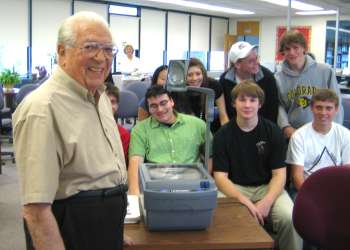
----
With reporting from June Martin
v2i17

Personable and passionate, Voss made it "up front and personal" for the student who came to hear him speak of the six years he and his family lived under Nazi rule. "Hearing about the Holocaust from someone who actually lived through it makes it much more realistic than reading it in a textbook," says student Travis Miller. He was inclusive of other countries where "ethnic cleansing" and the killing of innocents is taking place today. "Oh, we see them on television, we read about them in the newspapers," he said. "What are we doing about them?" He admonished the students to be tolerant of people who are different from them, and not to hate.
Voss was 12 years old when the Nazis came into power in 1933. On his confirmation day on April 1 he came home to find that the Nazis had begun boycotting Jewish stores, including his family's. They could not have his confirmation party because they couldn't get into the store where they lived upstairs. Two years later he was beaten by fellow classmates in school because he was Jewish. "I remember when one of our teachers, who dressed in a black SS uniform, told me one day that I should stand up in class so that the other students could see what a Jew really looked like," he said.
Another teacher made Jewish children stand at attention while the rest of the class sang "When Jewish blood gushes from our knives." These stories were all the more chilling told in the High School. Before the Nazis ruled German students wouldn't have imagined such atrocities taking place in their school, just as Lansing students do not in our time.
 Each story, more outrageous than the last, illustrated how fast Nazi power grew. He showed a picture of a yellow star belonging to his aunt. All Jews were forced to wear such a star when they went out. Failure to do so meant an automatic sentence to a concentration camp. He told of his experience on Kristallnacht, or Kristall Night ("Night of the Broken Glass") when the Nazis trashed and looted 7000 Jewish businesses, burned down 1000 synagogues, killed countless Jews and rounded up more, including Voss's father. He described watching bystanders who had come to see his temple burn.
Each story, more outrageous than the last, illustrated how fast Nazi power grew. He showed a picture of a yellow star belonging to his aunt. All Jews were forced to wear such a star when they went out. Failure to do so meant an automatic sentence to a concentration camp. He told of his experience on Kristallnacht, or Kristall Night ("Night of the Broken Glass") when the Nazis trashed and looted 7000 Jewish businesses, burned down 1000 synagogues, killed countless Jews and rounded up more, including Voss's father. He described watching bystanders who had come to see his temple burn.
The elder Voss's release paper from Buchenwald
One of the most remarkable incidents Voss related was when the Nazis told his mother that if she signed everything the family owned over to them that they would release his father. What makes the incident remarkable is that they actually did release him from Buchenwald, and Voss showed the students something very rare: a release form from a Nazi death camp. The elder Voss was very lucky. Six million other Jews were killed. A picture of naked bodies in a huge pile illustrated the cruelty and attack on life and dignity.
The Lansing students seemed stunned when Voss asked for questions -- it was a while before they began to ask. One asked how he could keep his faith during such an ordeal. Afterward Will Opperman said, "It was breathtaking to hear firsthand the story of someone who survived such a tragic period." Another student, Michael Kaplan, said, "Mr. Voss' story of his escape from Nazi Germany was both exciting and impressive. It is impossible to leave his presentation without thinking about how much life is taken for granted."
Casey Nassif said, "The presentation breathed realism into the terrible things that I had read about. The Holocaust seemed like history, but now it feels like yesterday." Jennifer Pasto added, "It was amazing how much energy he had and how strong he is as a person. It was very emotional and it was an honor to hear him speak to us."
After the afternoon session Superintendent Mark Lewis said, "As I listened to his words, I felt privileged to be in the presence of someone who not only could speak first hand about one of history's most atrocious acts of inhumanity, I also felt a sense of awe knowing that he could do so in such a straightforward, objective manner. In this way he allowed the facts of the Holocaust to speak for themselves, which added significant power to his message."
 Voss came to the United States in 1940 and volunteered to serve in the US Army. In 1944 he was part of the liberation of Paris, and in 1946 he was assigned to Frankfurt where he helped provide relief for the homeless displaced people returning from concentration camps. Voss recently published a book, "Milestones and memories," that tells about his life before, during and after Hitler. All the proceeds go directly to the US Holocaust Museum in Washington, D.C.. An earlier book was used as a text book to teach German students about Kristalnacht in the late 1960s.
Voss came to the United States in 1940 and volunteered to serve in the US Army. In 1944 he was part of the liberation of Paris, and in 1946 he was assigned to Frankfurt where he helped provide relief for the homeless displaced people returning from concentration camps. Voss recently published a book, "Milestones and memories," that tells about his life before, during and after Hitler. All the proceeds go directly to the US Holocaust Museum in Washington, D.C.. An earlier book was used as a text book to teach German students about Kristalnacht in the late 1960s.Voss told the Lansing students, "I have never accepted one cent (for speaking engagements or books) because I will never make money on the blood of the victims." He said his mission is to teach people to be tolerant of each other, saying, "Please do me one favor: stop hating."

----
With reporting from June Martin
v2i17



